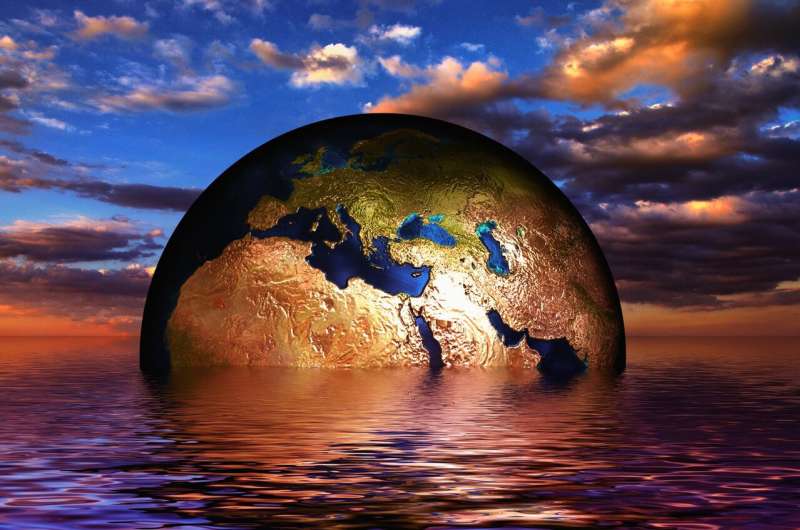This article has been reviewed according to Science X's editorial process and policies. Editors have highlighted the following attributes while ensuring the content's credibility:
fact-checked
trusted source
written by researcher(s)
proofread
It is not just heat waves—climate change is also a crisis of disconnection

Climate change is widely recognized by the scientific community as "the biggest global health threat of the 21st century."
However, climate change isn't just about greenhouse gas emissions. At its core, it is both a symptom and a cause for the centuries-long trend in declining social connection and community cohesion.
A modern atomized life
Consider this: If human history was summarized in 100 minutes, modern life would only take shape in the last 30 or so seconds.
In these last 30 seconds, human beings began domesticating plants and animals, built cities, invented factories and began harnessing electric power. These novelties totally revolutionized how we relate to each other and the world around us.
Prior to the modern age, most humans lived in small collective bands, surrounded by extended family, and hardly ever ventured far from home. These traditional lifestyles are increasingly rare as the pressures of capitalism and colonialism homogenize our lives.
Across the globe, people increasingly live in cities and are forced to abandon traditional lifestyles. Social networks have divided and grown smaller and smaller. Despite efforts to resist declining social connection, we increasingly organize ourselves into disconnected and competing family units. As a result, rates of loneliness are elevated and increasing in nearly every global region and our attachments to one another are becoming less and less secure.
Consequences for our planet
The consequences of modern life don't end with growing rates of loneliness and social disconnection. Indeed, in the same fraction of time that we revolutionized human social life, we have also dramatically increased our demand on the world around us—clearing billions of acres of forests, releasing billions of tons of greenhouse gases into the atmosphere and imposing vast infrastructure upon this planet and its non-human inhabitants. Moreover, we are losing traditional ecological knowledge needed to protect our environments. These atomized lifestyle changes have been costly to the environment.
In addition to the more environmentally intensive lifestyles we now lead, our increasingly individualistic culture has emerged as a key driver of environmental degradation. Studies suggest that tribalism and polarization are stifling our ability to respond to the environmental threats we are increasingly facing.
A vicious feedback cycle
Perhaps of greatest concern, it is apparent that there is a vicious feedback cycle between climate change and poor social cohesion. In fact, there is a growing body of research showing that climate change will not just be worsened by our social disconnectedness, but will itself contribute to greater disconnection. Climate change and our modern social ills are linked.
As exemplified by recent media reports, even close families and friends experience conflict over climate change. Such conflicts may arise from disagreements about how to live our lives in an environmentally conscious way and this potential is increased by important gender differences in climate anxiety.
Couples worried about the future may therefore experience conflicts over whether to have kids. For other couples, climate change may reduce intimacy, increase intimate partner violence and threaten sexual and reproductive well-being. Indeed, there is compelling evidence that unseasonably warm weather is associated with a decline in births nine months later, which suggests that changes in the climate could impact intimacy between partners. Climate change is a wedge issue that has the potential to drive us further and further apart.
While the decision to not have kids may have many environmental benefits, living and aging without children can have its own difficulties—including increased risk for loneliness and isolation. The feedback cycle goes both directions.
Moreover, at the population level, these impacts are compounded. Extreme weather effects can increase the rate of interpersonal violence. Declining birth rates lead to considerable economic impact. And mass migration creates cultural challenges such as those driving the re-emergence of extreme-right parties in Europe.
The way out
Put simply, human life has changed at a breakneck pace and our biology, ecology and psychology have failed to keep up.
As Indigenous peoples have taught for centuries, its time we recognize that all things are interconnected. If we don't act, climate change will worsen our social bonds, which will only reduce our capacity to respond to the environmental threats that lie ahead. The climate will worsen and the cycle will continue.
However, there is a way out of this vicious feedback loop: we can reverse the centuries-long trend in disconnection by treating social and environmental health on par with physical and mental health.
Our own research suggests that promoting social connection is key to reducing the harmful effects of climate change, including its effect on mental health. Other studies also show that the more connected we are, the better we will be able to discuss and respond to climate change.
Of course, if the last few decades are any indication, we must acknowledge that social connection and cohesion is difficult to achieve. If modern life were conducive to healthy social lives, we would not be where we are today.
This is exactly why we need renewed public and philanthropic investments in social cohesion and community life. For example, friendship benches in Zimbabwe provide a leading example for how relying on and strengthening community can help people live happier and healthier lives. We must learn from communities leading the way across the globe if we are to survive and thrive in the midst of environmental change. Indeed, climate change requires us to come together.
Provided by The Conversation
This article is republished from The Conversation under a Creative Commons license. Read the original article.![]()




















